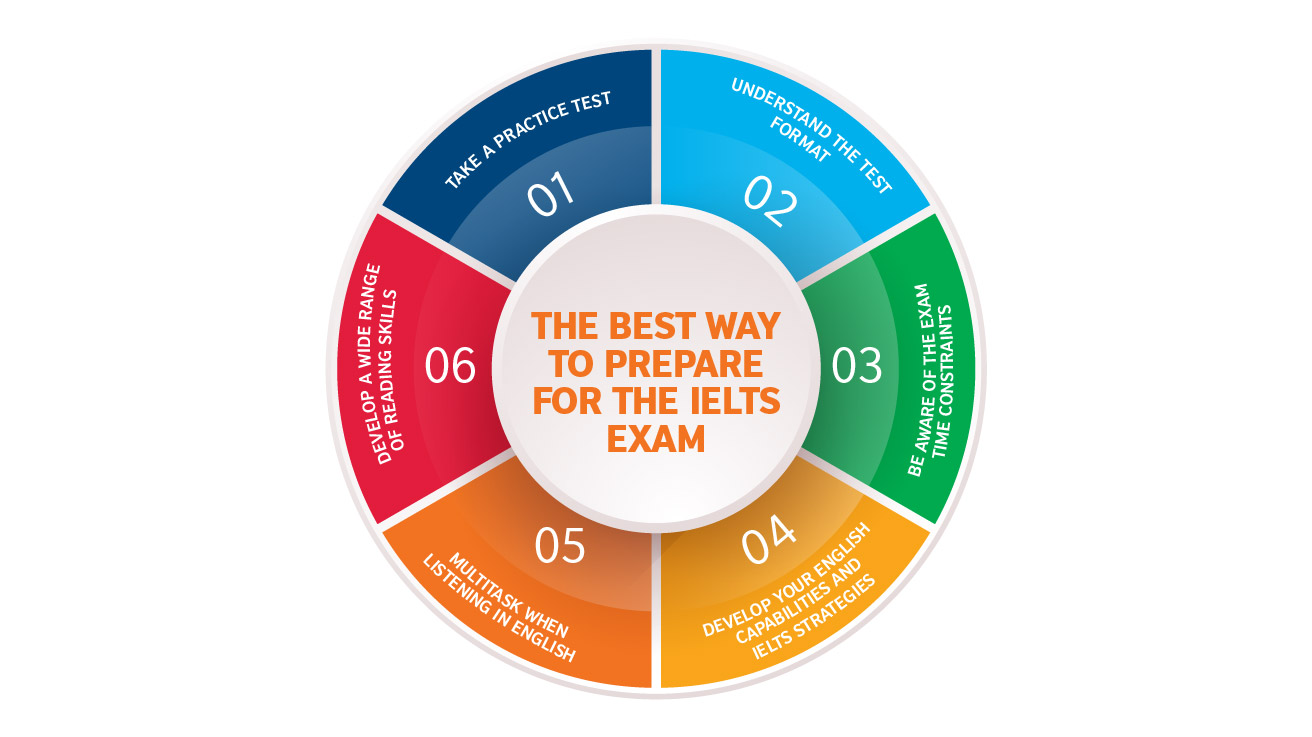Planning to take the IELTS exam? Need assistance in your preparation. This blog provides actionable tips for IELTS preparation.
In the past few years, over 3.5 million people across the globe have taken IELTS, according to ielts.org. That’s a massive number! And this proves that IELTS is a high-stakes exam. There are several reasons why people choose to take the IELTS.
The primary reason for appearing for IELTS is higher education opportunities abroad. IELTS is accepted by many English speaking countries abroad for undergraduate and postgraduate admissions.
And the second best reason for taking IELTS is migration opportunities abroad in countries like Australia, Canada, United States, United Kingdom, New Zealand etc. Cracking the IELTS can open up the door to a totally different world. It presents numerous opportunities and can change your life forever.
All these may sound quite exciting to you. But the truth is that IELTS is one of the most tricky exams to crack. Many test-takers struggle to understand the actual pattern of the exam. On the other hand, there are others who reattempt IELTS many times, but without any luck. But, most of the people who appear or reappear for IELTS fail to make a strategy.
A preparation strategy for IELTS is what they need the most. Having a plan on how to prepare and what to prepare is what the test-takers fail to look into.
Here we are going to discuss some of the key tips that you must follow while preparing for IELTS. These IELTS preparation tips will help you if you are looking to achieve better results in the exam. It will primarily help you follow a strategy so that you can crack IELTS in your very first attempt.
We have kept the latest IELTS syllabus for 2023 in mind while writing this blog. And the practical tips that we discuss here are applicable for both, academic and general IELTS test-takers. The IELTS preparation tips discussed here are the best advice and suggestions you’ll ever find anywhere.
So let’s begin discussing the tips for IELTS preparation in 2023. Below we have given a detailed strategy on how to prep for each of the 4 modules. We have also included some of the best books and resources recommended by our IELTS specialists.
Tips for IELTS reading preparation
IELTS Reading consists of 40 questions, divided into 10 questions in each of the 4 sections. The difficulty level increases with each level that you attempt. The reading sections are quite the same for both academic and general tests, except a slight variation in the topics.
IELTS academic reading is more general, focusing on topics like science and technology. On the other hand, IELTS general reading is more straightforward based on everyday scenarios in the world, world history, social sciences, etc.
The following prep tips will help you ace the IELTS reading test-
- Be aware of the test structure first. Know how many questions you are supposed to attend and what those question types are.
- Start preparing for topics which you find easier. Then slowly move on to the topics that seem difficult for you. You can take help from an IELTS trainer for that.
- Read novels, magazines, and books that will help you sharpen your vocab, and eventually improve your reading and writing skills.
- Read good-quality materials. There are plenty of IELTS resources to help you with that. Road to IELTS is an excellent one to start with.
- Practice mocks frequently so that you can gauge your performance before the exams.
- Books such as the Cambridge series for IELTS Reading will take you through everything that you need to know.
- Improve your grammar basics. A majority of test-takers make the mistake of ignoring to build their grammar.
- Don’t try to understand every passage. Understanding the questions is more important than understanding the passage.
- Get a trainer if you feel you need help with your preparation. Kanan International’s IELTS trainers can guide you with their expert assistance and coaching.
- Don’t choose too many books and mocks. It’s better to invest your IELTS preparation time in better study materials rather than in all types of materials.
- Don’t spend too much time preparing for one section alone. Try to divide your time wisely on each section.
- Aside from building vocabulary and correcting your grammar, you must speed up. Improve your reading speed so that you don’t waste time in the actual exam.
Tips for IELTS writing preparation
The IELTS writing exam lasts for 1 hour and has 2 parts: writing task 1 and writing task 2. Writing task 1 is different for both academic and general IELTS. In academic IELTS writing task 1, you are asked to write about a graph or a chart given to you and present your arguments in a realistic way.
On the other hand, in general IELTS writing task 1, you’re asked to write a letter. Task 2 for both remains the same, that is writing an essay on any given topic. IELTS essay topics range from art, business, communication, economics, education, environment, food, to health and technology.
Here are the preparation tips that you should follow for your IELTS writing:
- Write something every day before the exam. It’s important that to build your writing skills you must write daily. Spend at least 30 minutes to write down what you read or watch or simply what you think about any topic.
- Get your writing reviewed by a person who knows what goes in the IELTS writing test. If you don’t have a choice, simply ask someone who has better English skills than you.
- To write well you must focus on your grammar and vocabulary. If your English foundations are strong, everything else will fall in place.
- Be sure to follow IELTS writing instructions before you jump in to work on the practice papers.
- Practice writing mocks because those are going to boost your confidence a lot.
- Read and watch good-quality English content because that will have a direct impact on your writing skills
- Time yourself when you practise because you would have to do the same in the exam hall.
- There are many IELTS writing resources out there, such as on websites like British Council and IDP. You’ll find plenty of free tips and guides on these websites.
- Books such as Barron’s Writing for the IELTS and The Official Cambridge Guide to IELTS are the most recommended for IELTS writing.
- If self-studying for IELTS seems difficult, consider getting a trainer. Kanan International’s trainers can guide you with the writing test.
- Follow a time-table while studying for IELTS. It helps especially when you are practicing writing tests.
- Make sure you understand each topic before you start writing. Examiners can identify if you have really understood the topic or not.
Pro tip: Please remember that you need to write a minimum of 150 words in task1, and minimum 250 words in task 2. But avoid writing too much for the sake of extending the content length. Besides following the 150/250 word limit, you need to focus on clarity, handwriting, and presentation of your ideas in a logical way.
Tips for IELTS listening preparation
IELTS listening tests remain the same for both academic and general test-takers. There are overall 40 questions and you must complete the test within 40 minutes. The listening section has 4 parts, with an increasing difficulty level. Each recording that you hear is different, with a change in the context.
Here are some of the prep tips for your IELTS listening test:
- Know the structure of the exam and what is there for you. You must know the types of question formats so that you can plan.
- Listen to podcasts and different types of audio scripts to enhance your skills.
- Identify what your weaknesses are in the listening section so that you can work on those.
- Think in English when you talk or write or speak. It will reflect on your listening skills as well.
- Converse and use everyday English as much as possible. It will make the process easier for you.
- Try to practice listening and reading out loud. Figure out what is it that you don’t understand.
- Check out resources on IELTS listening online, such as Road to IELTS.
- Books like Barron’s and Cambridge series on IELTS listening are great ones to start preparing with.
- Take up listening mocks. Also, listening answer sheets are available for free on many websites. You can download and practise them.
- Watch and listen to movies and series without subtitles. It will help you somewhere subconsciously.
- Focus on silly mistakes and grammar errors when you write while practising.
- Don’t write the answers too quickly when you practice. The key is to pay attention to what you listen to.
Tips for IELTS speaking preparation
The IELTS speaking part is the same for both academic and general test-takers. It includes 3 parts, that is starting with an introduction about family, work, etc.; presenting ideas about a given topic; and then discussing the previous topic in part 2.
Many students consider IELTS speaking the toughest part. Most of them don’t feel confident when it comes to speaking and presenting their thoughts in a clear manner. The very thought of speaking for 15 minutes before someone makes them anxious.
Here are your prep tips for IELTS speaking:
- Practise speaking in English for your benefit with a partner. If you don’t have one, record and listen to yourself.
- Use a range of grammar and vocabulary when you speak.
- While practising how to speak, always think and answer.
- Avoid using any fillers while speaking.
- Try to answer questions briefly but use a range of words.
- When you speak, try to extend the answers and not just answer in a few yes or no phrases.
- Never try to memorise answers. That’s not going to help you.
- Don’t think too much about your accent while speaking.
- Don’t speak in a flat tone. It’s better to put emphasis on some of the words and phrases when you speak.
- Read and listen to a range of topics. Only then can you improve your speaking skills.
- IELTS speaking is just for 15 minutes but that doesn’t mean your prep time should be shorter. Invest an equal amount of time.
- Try observing how good presenters and speakers talk. Don’t mimic anyone, try to learn from them how they present themselves.
Tips to follow on the day before your IELTS exam – common Do’s and Don’ts
The day before your IELTS is as important as the test day. A lot can go wrong right before the test day. Not only must you be prepared well for your exams, but you must also be in a good mood.This is especially true for those who are retaking the IELTS exam since there will be added pressure on them to do well in the test.
Here are some suggestions and do’s and don’ts from our IELTS specialists on what you should do a day before your exam –
- Don’t stay awake late into the night the day before your exam. Studying till the last moment or worrying about the exam will eventually send you into panic mode.
- Be positive. Have a positive attitude that you will give your best shot at the exam.
- Be prepared with your stationeries and other things that you will need for the test.
- Eat well and eat good food. Don’t get into an unwanted situation by eating improper and wrong food the night before.
- Visualize that the outcome of your exam will be good. But don’t think too much of the results.
- It’s better that you take the day off, right before the test day. Giving a break to your mind can have a positive effect.
- Read something light before you go to bed.
- Listening to music or writing something in your diary or journal before you sleep will also help.
- Be aware of the rules that you must follow. Try to go through the instructions once more.
- Practise a few mocks, but don’t practise everything in one go. Just focus on what’s more important for you.
Tips to follow on the day of the IELTS exam – Do’s and Don’ts
Here are some last-minute tips and do’s and don’ts to follow right before the test on the test day. Make best use of these suggestions that we have put together just for you.
- Try to start your day early since that will give you a lot of time to relax and settle down for the exam.
- Eat well before the test since you’ll hardly have any breaks in between the exams. Don’t think that you can focus on your exam on an empty stomach.
- Reach the exam centre early, at least 1 hour in advance. Make sure you are aware of the correct address of your exam centre. Being late may unnecessarily put you under pressure.
- It’s important to keep yourself hydrated so please carry a bottle of water with you.
- Do not carry your phones or better switch them off since that may create some unwanted situations.
- Do carry your Identity Proofs – you must know which ID proofs you need to carry on the day of the test. Speak to the admin of your test centre early on so that you come prepared to the centre.
- Carry all your stationeries without fail. You don’t want to beg, borrow, and steal!
- Listen to the instructions at the test centre carefully before you begin your exam.
- Figure out where the clock is in the room so that you can time yourself for the test.
- Stay calm and don’t indulge in unnecessary conversation with anyone since that may exhaust you.
Below we have mentioned some common do’s and don’ts that you must remember before entering the test hall and while attempting the test as well.
First, the do’s
- You must address the problems that you face during the exam to the test supervisor. Let’s say if your headphone doesn’t work, please inform since that’s a technical fault.
- Always raise your hand to ask something to the supervisor. Please don’t call out someone since that may distract other test takers during the test.
- While listening to audios during the listening test, jot down the points that you find relevant for the answers. Remember that the audios are played only once.
- Read all the questions thoroughly before you begin your test. Most IELTS examiners feel that students spend a lot of time reading passages while they should be reading the questions carefully.
- If you are unable to figure out an answer to any question, don’t spend time over thinking. Move on to the next.
- Speak confidently during the speaking test, focusing on what you are trying to convey.
Now, the don’ts
- Avoid cheating or asking questions around the exam hall.
- You cannot carry any devices or use dictionaries and spell checkers during the test.
- Borrowing or lending things is not allowed at the exam hall.
- You should not carry any food items with you.
- You are not allowed to leave the room suddenly during the test.
- Do not carry any question papers or working sheets along with you. If you indulge in any malpractices, you may not be allowed to take up the exam.
- Any kind of discussion with anyone is not allowed, even if your friend is in the same room.
IELTS preparation tips to score band 8
How do I get band 8 in IELTS? Is this question keeping you up all night?
“To score a target band of 8 in IELTS, follow the rule of 8.5-8.0-8.5-7.0. This means you must score a minimum 8 or 8.5 in any of the 3 sections. And you must have a minimum score of 7 in any one section.” Otherwise, there will be a significant dip in your overall exam result [below 8].
We have put together some advice and tips from our IELTS experts. These tips will guide you to score band 8 in your next IELTS. Check them all out –
- Build your vocabulary – by saying this, we mean you must work on improving your range of words and put them to use. But you must not misuse and use too many vocabs to show off your skills.
- Understand the test pattern – Most of the test takers fail to understand the exam pattern completely. IELTS is not like any other exam. Every test taker must understand the IELTS exam pattern including total number of hours, number of questions, sections, scoring etc.
- Understand the questions first – a majority of test-takers do not read the questions carefully. The answers lie in the questions. So you must focus and understand what the questions are.
- Understand the test formats – unless you know the test formats, you’ll be wasting your time and effort. To score 8, you have to be aware of what the IELTS official format is.
- Collect study materials – study materials will make a lot of difference. In order to score 8, you need all high-quality books and resources. If you’re slightly low on budget, try taking help of online library memberships.
- Get the latest exam syllabus – depending on the year you choose to take the test in, the syllabus will change. You need the latest IELTS syllabus with you before you start making a plan.
- What do you want to do with the band – ask yourself why you need band 8. Is it to migrate to Canada or apply abroad for your higher education? Having a goal always works in your favor.
- Consider coaching – self-studying isn’t for everyone. If you need IELTS coaching, reach out to a professional mentor. At Kanan, you’ll find many professional IELTS trainers. We have both offline and online classes for the test-takers. And we don’t hesitate to accommodate our students in different batches based on their flexibility.
- Practise every day – choose mocks that are really helpful and practise them every day. At least an hour of practising mocks daily will help you to a great extent.
- Get advice – whenever you practise or read or write something, consider the work getting checked by someone who has good English skills. This method will help you when you are self-studying.
- Timing is important – discipline is key if you are looking for band 8. Unless you time yourself while practising, it will be difficult to score higher. This is because when you go by the time, you stay focussed. So ensure you consider timing yourself to get band 8 in IELTS.
IELTS computer-based test
- CBT or computer-based test for IELTS is similar to PBT or a paper-based test. There is a myth that both are different. That isn’t true. Both examination formatare same. In Fact, the IELTS exam fee for both CBT-based test and PBT based is also the same.
- The difference between CBT and PBT is that the reading, writing, and listening sections for CBT are taken up online.
- The speaking section for CBT, however, remains the same as that for PBT, i.e., in-person.
- CBT happens in smaller groups, and each test-taker is given a computer booth during the test.
Tips to prepare for computer-based IELTS
- You must be well-prepared with your writing ability on a computer. The advantages of writing by typing are many.
- You don’t need to be efficient in using a computer, but at least have the basic knowledge of editing and using short-cut keys, so that you save some time.
- CBT doesn’t affect your score. So any myth that you hear about CBTs is totally wrong. Ignore those!
- Navigation to questions on a computer screen is much easier. Be familiar with all that before taking up CBT.
- Last but not least, with CBT you can track the word limit. Make sure you are aware of how to check that on your screen.
- Be prepared with your listening tests beforehand. If you are not allotted a headphone of your own, ask for one.
IELTS preparation checklist
Aside from the dos and don’ts that you must follow for the IELTS exam, you should have a checklist of your own. An IELTS preparation checklist will help you understand where you stand before the exam. But this checklist should be prepared at least 2 or 3 days earlier, and not at the last minute.
Here are a couple of questions that you must ask yourself:
- Do I know all the question formats?
- Did I prepare based on the topics that are usually covered?
- What’s my level of English now after a few weeks’ of preparation?
- Am I taking help from professional IELTS training classes?
- Did I practice enough mocks on all 4 modules?
- How did I assess my knowledge?
- Was there anything that I missed in my study plan?
- Did I give myself enough time to prepare?
If you can tick all the boxes, then here you go – your checklist is ready. The checklist here for IELTS can be fine-tuned based on your way of studying for the exam.
For instance, if you have an IELTS trainer to support you, you can add additional mocks/classes to your list. You may also add some resources to the checklist.
Remember that it’s important to have a test-taking strategy no matter how many times you appear for the exam. And this kind of checklist will help in ensuring that you have a goal.







